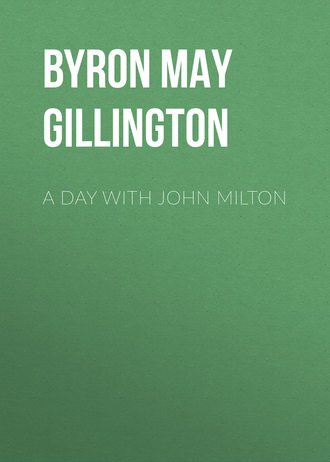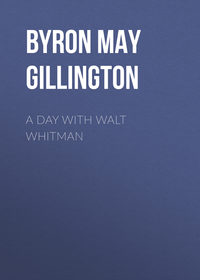 полная версия
полная версияA Day with John Milton
Sometimes he sang as he played; sometimes Mrs. Milton, with her clear unemotional notes, sang to his accompaniment. Presently, that Elwood should not be wearied in his blowing, he quitted the organ for the bass-viol, on which he was no mean performer. At the conclusion of his playing he sat with a rapt, transfigured face, such as might well have called forth the Italian's encomium, thirty years before, – "If thy piety were equal to thy understanding, figure, eloquence, beauty and manners, verily thou wouldest not be an Angle but an Angel!"
And, now, good Tom," quoth Milton to the young man, "let us to work: the day moves on apace." They went upstairs to the study. "Before we read, I have some forty lines to set down," continued the poet, "all day they have been knocking for admission, and with that last music they made entrance. Needs must I house them now in ink and paper."
"I am instant at thy bidding, friend," and Elwood seated himself with dutiful alacrity at the table. Milton, placing himself obliquely athwart his elbow-chair, with one leg thrown across the arm, dictated forty lines, almost in a breath, – they burst from him, as it would seem, in a stream no longer to be restrained.
"Gently, gently, good sir!" exclaimed Elwood, "slow-witted and slow fingered I may be, – but I cannot keep pace with thee!"
A grim smile hovered over Milton's full lips, "Out of practice, Tom," he replied indulgently, "it is a long while since I required this service at thy hands. From the autumnal to the vernal equinox, as I have told thee, my muse lies dumb,
and silent as the moonWhen she deserts the night,Hid in her vacant interlunar cave.But now the winter is overpast, the singing of birds is heard in our land, and she too awakes and sings. With the vernal equinox my thoughts flow free as Helicon." Then, with slow and deliberate diction, he repeated the lines once more: and, having had them read aloud to him, he compressed, condensed, concentrated every thought and phrase, and reduced them to twenty.
"There is more to come?" queried Elwood, his quill poised ready to write.
"No more. Not one word more at present," replied Milton, sighing as though somewhat exhausted.
His inspiration was entirely intermittent: and sometimes he would lie awake all night, trying, but without success, to complete one single line to his liking. "They please me not wholly, these lines," he continued, "much remains to be done before I set them down to be changed no more."
"Not every man would say so," replied Elwood, "the learning and erudition whereof these few lines alone give witness, would supply many with just cause for boasting throughout a lifetime."
Milton shook his head. "Pomp and ostentation of reading," he remarked, "is admired among the vulgar: but in matters of religion, he is learnedest who is plainest."
"And may at last my weary ageFind out the peaceful hermitage,The hairy gown and mossy cell,Where I may sit and rightly spellOf every star that heaven doth show."(IL Penseroso.)"Yet, Mr. Milton, thee hast the reputation of such scope and range of wisdom, as the greatest scholar in Europe might fitly envy. To me, I confess, in my poor unlettered ignorance, it is not conceivable in what manner thee acquired so great and witty powers."
"I gathered them not of mine own strength," said Milton, "but they were mine for the asking and endeavour, and any man may obtain them in like fashion. I ceased not, nor will cease, in devout prayer to the Holy Spirit, that can enrich with all utterance and knowledge, and send out his Seraphim with the hallowed fire of His altar, to touch and purify the lips of whom He pleases. To this must be added select reading, and steady observation, and insight into all seemly and generous acts and affairs… And now, good Tom, to reading."
Elwood took up the Latin author which he was at present engaged upon, and proceeded with it. Whenever the preternaturally acute ear of Milton detected, by Elwood's intonation, that he did not quite understand a sentence, he would stop him, examine him, and elucidate the difficult passage. By and by, "You will find a saying very similar to that," he observed, "in Virgil his Fourth Eclogue. Fetch down the book, and let us hear what the Mantuan hath written therein."
Elwood searched along the bookshelves, but to no avail. "Friend," said he, "thy Virgil is no longer here. Yesterday I handled it myself, – to-day it is vanished. So is the Lucretius." A frown contracted Milton's splendid brow. "These women-kind," he muttered like rumbling thunder, "they are verily the root of all evil. Bid me hither my wife and daughters, and Mary Fisher the maid moreover." The first and the last, being summoned, arrived in all haste, and disavowed any knowledge of the missing books. Anne and Mary Milton, it appeared, were gone out marketing: but little Deborah, being strictly cross-examined, confessed that she had seen sister Anne carrying books away from the study last night when their father had retired: the wherewithal for "marketing" was easily obtained in this way.
Milton groaned in his ineptitude. "How have I deserved this treacherous dealing at their hands? Lord, how long shall I be
dark in light exposedTo daily fraud, contempt, abuse, and wrong,Within doors and without, still as a foolIn power of others, never in my own?(Samson Agonistes).Here, by a happy coincidence, there was a sturdy hammering heard at the front door, and Andrew Marvell was ushered in, "I am out of my due time," said he, "for it is not yet gone six," – (six to eight P.M. being Milton's best time for receiving visitors). "Yet to so old an offender as myself, John, I know thou wilt make an exception." Marvell was the one friend of his own type and standing, the one constant and inalienable comrade, upon whose fidelity the blind man could rely. He had formerly been Milton's colleague under the Cromwellian Government: and was his kindred spirit, so far as anyone could claim such relationship with the frozen heights of the poet's intellect.
With him, during the next two hours – the learned physician Paget joining them, and Elwood listening in respectful silence to the converse of these mighty men – Milton forgot the vexations of his ill-assorted household. He assured his friends that he was truly far happier now, in poverty, infirmity and neglect, occupied solely upon his long-projected masterpiece, than during the eighteen years of his manly prime, when his mind and pen were solely employed upon the controversies which he now professed to hate. "Never again," he declared, "shall earthly ambitions interrupt and thwart me: never now shall I endure to leave a calm and pleasing solitariness, fed with cheerful and confident thoughts, to embark in a tumbled sea of noises and hoarse disputes. Cast out of my fool's Paradise of fame not worth the finding, shall, not I and the hope whereunto I am wedded explore some fair and fragrant tract of outer Eden? Even as I have set forth the banishment of our first parents:
Some natural tears they dropped, but wiped them soon;The world was all before them, where to chooseTheir place of rest, and Providence their guide.They, hand in hand, with wandering steps and slow,Through Eden took their solitary way.(Paradise Lost).I and my espoused hope indeed do tread through Eden."
The four men now, at eight o'clock, went down to supper: a very spare and frugal meal, so far as Milton was concerned: for all he consumed was a little light wine, a piece of bread and a few olives. His flow of speech was still unwearied, his spirits as near vivacity as they could approach it, when his friends rose to take leave. "The night is yet young," said Paget, "but I know that nowadays you seek rest early." "That is so," Milton assented, "since I am no longer able to study o' nights, and since the best of secretaries," – he smiled towards Elwood – "must needs grow weary of a blind man's whims, I were as well in bed as out of it. Moreover, I can compose my lines to better advantage lying down."
"One thing, at least, you are spared," Marvell told him, "darkness cannot discommode your doings, nor doth the eye-weariness of the midnight student afflict you with grievous brow-aches in the morning as of old."
Milton answered, "My darkness hitherto, by the singular kindness of God, amid rest and studies, and the voices and greetings of friends, has been much easier to bear than that deathly one. What should prevent me from resting in the belief that eyesight lies not in eyes alone, but enough for all purposes in God's leading and providence? And to you now I bid farewell, with a mind not less brave and steadfast than if I were Lynceus himself for keenness of sight."
In a short space of time he was at rest in his darkened room; not as yet drowsy, but revolving great phrases, and deriving a greater joy from these lonely silences of the night-watches than could ever accrue to him by day. Gradually the aisles and bowers of the Paradise which his mental eyes enjoyed took upon them more and more the lovely similitude of rural England. The greennesses and sweetnesses of his childhood's home, the Buckinghamshire village, were fused into the "eternal spring" of the primeval garden. And from the "glassy, cool, translucent wave" of the river that ran through Eden,
"by the rushy-fringed bankWhere grows the willow and the osier dank,"arose "Sabrina, attended by water-nymphs" as once he saw her rise in Comus, and sang the sightless bard to sleep with the plashing of water-music.









